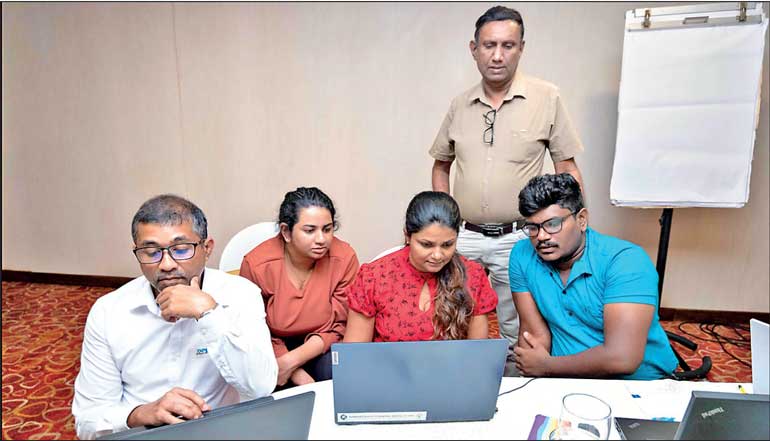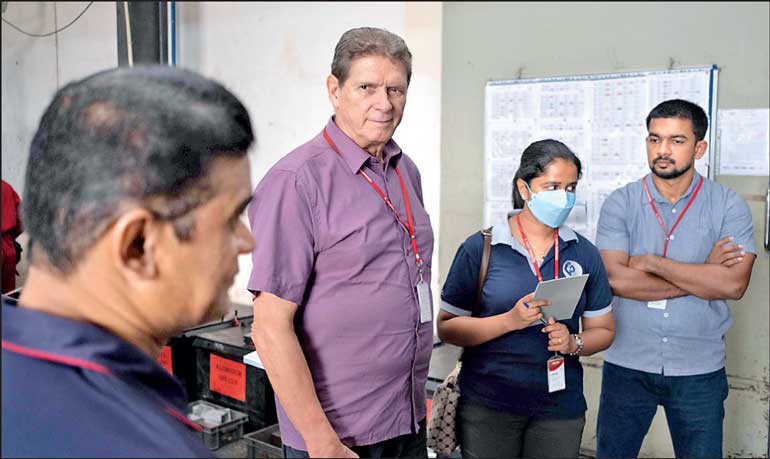Wednesday Feb 25, 2026
Wednesday Feb 25, 2026
Monday, 13 March 2023 00:40 - - {{hitsCtrl.values.hits}}

Women are an imperative in climate response action

Male and female industry professionals at a recent UNIDO Energy Management training in Colombo

At the recent United Nations Climate Change Conference (COP27) in November 2022, Sri Lanka presented to the world a new Climate Prosperity Plan. This Plan sets out strategies to reduce Greenhouse Gas (GHG) emissions. It charts a course to decarbonise the island nation’s economy, implement a green energy transition and gain long-term energy security.
With these international commitments, a shared vision of the green economy of the future has emerged. At its heart is a more energy efficient, digitised and circular industrial sector, with businesses powered by a mix of renewables, using low-carbon materials and therefore cleaner and more competitive.
But achieving this vision hinges on several factors. Most obviously, rolling out renewable energy and boosting industrial energy efficiency. Less apparent, success requires all hands on deck, including women. They must be empowered on an equal footing with men in developing and deploying the solutions urgently required to avoid and mitigate the worst effects of climate change.
Better for the planet and better for profits
Today, women in Sri Lanka occupy less than 25% of upper and middle management positions. When it comes to the industrial sector, women are historically under-represented, with their participation often visible in low-skill jobs in the plantation and textile industry.
It is time to change this. Sri Lanka has much to gain by significantly boosting the number of women in leadership on factory floors, in engineering teams, in finance institutions investing in clean technologies. More women are also needed to shape the policies that will bring a more sustainable future to Sri Lanka.
Studies show that women in leadership roles are more likely to invest in renewable energy and to contribute to the reduction of the carbon footprint of entire value chains. More women at the top has the potential to accelerate Sri Lanka’s green energy transition. At the same time, according to the United Nations Industrial Development Organization (UNIDO), women excel at managing energy in households, communities and businesses. Alongside the deployment of renewable technologies, cutting industrial energy waste is a critical strategy in Sri Lanka’s plan to reduce GHGs. With better energy management, companies can save up to 25% of their production costs.
Meanwhile, when it comes to corporate management and the boardroom, gender diversity means that there is a wider range of perspectives, ideas and approaches on the table. As a result, more inclusive and diverse boards consistently achieve better results and improve the bottom-line of companies across the globe.
More women in the workforce
While many women in Sri Lanka successfully complete professional qualifications in a range of fields, including Science, Technology, Engineering and Mathematics (STEM), their participation in the paid labour force remains half that of men’s: around 31%, and this number has not shifted for decades.
Right now, women in Sri Lanka face a range of social, economic, and cultural barriers that limit their access and ability to excel professionally. Established gender norms and institutionalised stereotypes drive underrepresentation in the workplace, with marriage, maternity and wage expectations contributing to women staying at home.
Addressing the gender gap in STEM fields is of utmost timely relevance as Sri Lanka navigates through an economic crisis. With an increasing number of jobs being digitalised, it is essential that women are not left behind in this transition and contribute to the development of a more equal and sustainable future economy. Closing the gender gap in STEM will ensure that women have access to more high-skilled employment and are meaningfully included in the economic growth that is driven by technology and innovation. Further, as these fields evolve and expand, women’s capabilities and perspectives are increasingly important in finding innovative, inclusive and effective solutions to complex societal challenges.
To reach its full potential, Sri Lanka needs to use all its talent and diversity, which means ensuring that more of its female graduates, especially those qualified in STEM, enter and stay in the workforce. More women also need to be encouraged to consider careers in engineering and energy as boosting women in these fields represents a significant opportunity for Sri Lanka. With employment in the clean energy sector worldwide expected to grow almost fourfold by 2050, Sri Lanka is well positioned to groom a future generation of women leaders to accelerate the energy transition.
Seizing a historic opportunity
Aside from the economic benefits, the green energy transition also represents a historic opportunity to transform traditional gender roles and relations in Sri Lanka. Seizing this will require the concerted efforts of policymakers, industry leaders, academics, financiers and development partners.
Our collective task involves redressing gender-blind energy and industrial policies and drafting new ones based on evidence and gender-disaggregated data. It also involves implementing education and recruitment policies that will attract and retain female talent. It also means more support and financial flows for women-owned and led businesses, particularly in the booming clean technologies sectors.
Moreover, the theme for this year’s International Women’s Day – ‘DigitALL: Innovation and technology for gender equality’ gives context to this narrative. This theme also resonates with the broader EU commitments for which concrete action is already underway. For example, climate financing fuelled by the European Commission’s Green Deal aims to transform the EU and lead global action against climate change, with a focus on making this international support work for women and men. Closer to home, the Central Bank of Sri Lanka’s Roadmap for Sustainable Finance is a further step in the right direction, directing local financial institutions to prioritise products and mechanisms that finance clean technologies, renewable energy, and financial inclusion, especially for women.
Partnerships like the Accelerating Climate Response in Sri Lanka project are also making a difference. Implemented by the Ministry of Environment, Ministry of Industries, and the Ministry of Power and Energy in partnership with UNIDO and the EU, this EUR 7.81 million project (approx. Rs. 2.97 billion) is working with industries to integrate renewables, cut energy waste, and build the capacity of professionals in these new fields, especially women.
Above all, closing the gender gap and ensuring women’s participation in Sri Lanka’s promising green economy and energy transition has benefits for all: people, economies, and the planet. Achieving this is in everyone’s interest, and efforts will be much more likely to succeed if women play a central role.
(Denis Chaibi is the current EU Ambassador to Sri Lanka and the Maldives. He started his career in the Belgian Ministry of Foreign Affairs and has worked in Asia, the Middle East and Europe. Chaibi has degrees in law, political science, European studies, international law and an LLM from Cambridge University.)
(J.M. Thilaka Jayasundara is the Secretary of the Ministry of Industries. She has a long and distinguished career in government. She holds a B.Sc. (SriJ), PGDIT (SLIIT), MPA (SriJ), and has many international and national experiences in the productivity promotion movement.)